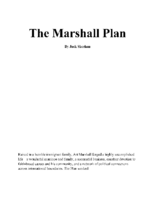Search the Special Collections and Archives Portal
Search Results

Transcript of interview with Renee Diamond by Barbara Tabach, November 20, 2014
Date
Archival Collection
Description
In this interview, Renee Diamond discusses coming to Las Vegas via Los Angeles, with her husband and children in the 1970s and getting involved in politics. She talks about her husband, Leo, and his business selling vinyl records in L.A., and her work in a doctor's office. Once in Las Vegas, the Diamonds joined Temple Beth Sholom and later Congregation Ner Tamid. Renee talks about her involvement in the political arena in southern Nevada, including the League of Women Voters.
Community activism and social justice rank high in the legacy of Renee Diamond. She often refers to herself as one of the last of the generation without college degrees that could make a difference in the politics of the state. When Renee, her husband Leo Diamond moved their family to Las Vegas from southern California, the energetic advocate Renee quickly plugged into the community. The word "No" was not part of her vocabulary. Among the many Jewish and secular activities the she engaged in were: the editorial board of the Jewish Reporter newspaper; Hadassah; Anti-Defamation League; Red Cross Board; State Museum Board to name a few. She remains a vibrant Democratic Party leader and served one term on the Nevada Assembly in 1989. She was on the front lines as a fierce and active supporter of Welfare Rights, Fair Housing and the Equal Rights Amendment. It is a life that included working alongside illustrious women and men of Southern Nevada history. A list that includes: Harriet Trudell, Ruby Duncan, Myrna Williams and Dorothy Eisenberg and many more mentioned here. Meanwhile she raised four children and enjoyed a loving 43-year marriage with Leo (aka "Uncle Leo") whose career included the popular Bingo Palace, Slots-A-Fun and Stations Casinos. During this oral history interview she recalls the Las Vegas that she moved to in 1972 and reflects on what attracted people here, ways to be part of the Jewish life which might even include a bowling league and how involvement in raising social awareness was a worthy investment of ones' time. This is a look at a woman who made a difference.
Text

Transcript of interview with Michael Saltman by Barbara Tabach, December 16, 2014
Date
Archival Collection
Description
In this interview, Michael Saltman recounts his family background, his schooling in Michigan, and living abroad in London and Munich. His travels to Israel in 1968 reinforced his connection to Judaism. Saltman and his wife, Sonja, moved to Las Vegas in 1975 and he began working with Larry Larkin, who eventually became his partner. He discusses several projects he completed with Larkin, including shopping centers and apartment complexes. He talks about the changes in Las Vegas that came about from the availability of financing from legitimate sources, and the population growth of the area. He then talks about his involvement in the local Jewish community with the Jewish Federation, Anti-Defamation League and Congregation Ner Tamid.
In 1942, Michael Saltman, the son of a rugged Canadian entrepreneur and of an educator, was born in Flint, Michigan. Michael spent a fulfilling childhood in Flint, where his family was involved in the Jewish community, even helping start a new temple. However, his life changed dramatically when his father passed away during his teenage years. At his mother's insistence, Michael went to law school after graduating from Michigan State University, and received his Juris doctor from Wayne State University. From Detroit, Michael headed to London to participate in an LL.M. program, though he quickly withdrew and landed a position with a life insurance and investment company in London. Michael soon relocated to the company's Geneva office, where his job included establishing operations in Israel. It was during these trips that he more intensely connected with Judaism and his Jewish identity. Michael left the company to join a former colleague at Shareholders Capital Corporation, where he met his wife Sonja. The couple moved to Munich, where they lived until 1975, until moving to Las Vegas. In Las Vegas, Michael became a successful real estate developer. His projects include apartments, shopping centers and office parks, like Village Apartments, Campus Village Shopping Center and Renaissance Center. He later opened Food 4 Less grocery stores in Nevada, Utah and California, eventually buying the Kansas-based company from Lou Falley. He and his partner later sold the company to Kroger. Michael served on the local Jewish Federation's board of directors, and Sonja is a longtime board member for the Anti-Defamation League's regional office in Las Vegas. In 2003, Michael and Sonja co-founded the Saltman Center for Conflict Resolution within William S. Boyd School of Law. Michael's other efforts to promote peaceful conflict resolution include the production of Streetball Hafla, a movie shot in Israel about Jewish and Palestinian teenagers interacting in basketball camp.
Text

Book, The Marshall Plan, by Jack Sheehan, 2013
Date
Description
Art Marshall is one of the founders of the Marshall-Rousso chain of women's dress shops that started in casinos in Las Vegas. He is also a banker, a member of the Nevada Gaming Commission, is active in the Anti-Defamation League and the Jewish Federation of Las Vegas, is an art collector, and is a philanthopist, especially for Jewish faith-based causes and for the University of Nevada, Las Vegas.
Text

Transcript of interview with Margaret Price by Joanne Goodwin, March 5, 1997
Date
Archival Collection
Description
When farm-girl-turned-waitress, Margaret "Maggie" Price, came to Las Vegas from Ohio in 1950 with her husband, Francis "Frank" Price, she had no idea what was in store for her in the hot desert oasis. Maggie's career spanned a period of historical transformation in Las Vegas when Downtown was becoming overshadowed by the development on the Las Vegas Strip. Vaudeville and striptease acts were still alive, but the arrival of big-named acts, such as the Rat Pack, Barbara Streisand, and the King himself, Elvis Presley, were just beginning to take the lead. Organized crime was still a prominent part of the culture and brothels still operated somewhat openly. The three decades Maggie and Frank worked in Las Vegas provided them with front-row seats for the birth, transformation, and occasional death of numerous casinos, including the Sahara, the Flamingo, the Sands, the Dunes, the Tropicana, and the International. Initially going to work as a waitress at the El Rancho Vegas, Maggie
Text

Transcript of interview with Betsy Fretwell by Claytee White and Stefani Evans, August 30, 2016
Date
Archival Collection
Description
Shortly before the University of Georgia granted Betsy Fretwell Master's degree in public administration in 1991, she applied for a one-year internship with Clark County, Nevada. The County hired her, but Fretwell did not complete her internship. Instead, the County promoted her, hired her full-time, and soon had her lobbying for the County's interests in Carson City. Her insistence on learning all sides of a question and communicating that knowledge to the decision makers was one of the skills that made her so valuable to Clark County administrators. In this interview, Fretwell discusses her South Carolina childhood, her affinity for the University of Georgia Bulldogs, and the path she took to occupy the office of city manager for the City of Las Vegas. She talks about her years at Clark County and a term at the City of Henderson, but she mostly focuses on her sixteen years at the City of Las Vegas, first as assistant city manager under Virginia Valentine and later as city manage
Text

Transcript of interview with Bruce Woodbury by Claytee White, February 25, 2009
Date
Archival Collection
Description
When Bruce Woodbury, native Las Vegan, attorney, and former county commissioner, looks back on growing up, he immediately says: My first memory of a house here in Las Vegas was in the John S. Park area. The Woodbuiy family lived in two houses in the neighborhood and attended only two schools, John S. Park Elementaiy and Las Vegas High School. Bruce's recollections begin in the 1940s, when they lived on the edge of town. Bruce has what he calls a "nostalgic yearning for the old Las Vegas, even though today it's an exciting, vibrant community in many ways." And during this oral history interview, he recalls the safe feeling of the times—unlocked doors and children allowed to roam more freely than today. The Strip was a "separate world" where kids like himself might go to a show occasionally with their parents, celebrate a prom dance or, as he did, get a part-time job. One of Bruce's jobs included being a busboy at the Flamingo Hotel & Casino where he confesses to learning and
Text

Transcript of interview with Sally L. Jackson by Krista Jenkins, March 2, 1980
Date
Archival Collection
Description
On March 2, 1980, collector Krista Jenkins interviewed assistant manager, Sally L. Jackson, (born March 28th, 1932 in Culver City, California) in her home in Las Vegas, Nevada. The interview covers the social and environmental changes that have occurred in Las Vegas. Sally also discusses the hospitality industry and offers details on the local hotels, casinos, and nightclubs in Las Vegas, Nevada.
Text

Transcript of interview with Ralph Denton by K.J. Evans, approximately 1999-2000
Date
Archival Collection
Description
On an unknown date (likely 1999-2000) and time, K.J. Evans interviewed Ralph Denton, an adviser to former Governor Grant Sawyer and political figure in Nevada for many years. Denton first talks about his personal friendship with Sawyer, their education in law school, and his eventual work on campaigning for and working with Sawyer after he became governor. Denton then explains the controversy regarding Denton’s accepting of complimentary services (comps) at hotels. He later describes his work as a Clark County Commissioner and then talks about working as district attorney in Esmeralda County, Nevada. Denton then talks about the influences that led him to be interested in a career of law and later speaks more about working with Grant Sawyer, specifically about serving as his adviser, afterwards providing the argument on why he believes Sawyer was the greatest governor of Nevada. Toward the latter part of the interview, Denton describes his work on improving civil rights and some of the challenges that came with that. The two also discuss how the practice of law has changed over time. To conclude the interview, Denton describes his experience in running for governor and how he would have served as governor if he had been elected.
Text

Transcript of interview with Betty Ham Dokter by Roger Jablonski, February 27, 1977
Date
Archival Collection
Description
On February 27, 1977, Roger Jablonski interviewed Betty Ham Dokter (born 1922 in Las Vegas, Nevada) about her life in Southern Nevada. Dokter first talks about her upbringing and education in Las Vegas before describing church activity and the first casino properties that were built. She later talks about presidential visits, economic changes in Nevada, the construction of Hoover Dam, and some of the social changes in Las Vegas. The latter part of the interview covers the topics of racial minorities, environmental changes, early grocery stores and movie theaters, and social clubs. The interview concludes with a brief discussion on Mt. Charleston.
Text

Virginia Houser interview, March 20, 1978: transcript
Date
Archival Collection
Description
On March 20, 1978, collector Karen Reed interviewed her grandmother, Virginia Houser (born on August 22nd, 1912 in Bartonville, Illinois) at her home in Las Vegas, Nevada. In the interview, Virginia Houser discusses working in Las Vegas at various stores as well as changes in the Downtown and Strip areas. She also speaks about the annual Helldorado Parade and other entertainment in the Las Vegas area besides gambling.
Text
